- Ever since the pandemic induced economic distress has rendered state governments gasping for a fresh infusion of monetary support, the Central Government appears keen to convey an impression, via few measures introduced in the immediate past that it is not owning up full responsibility to facilitate extending support and assistance wherever required. No wonder, the opposition parties are crying hoarse over the fiscal stimulus packages announced so far as neither substantial nor beneficial in the longer run.

PC: ET Bureau
- Though the jury is still out as to how effective these packages have emerged in mitigating the stuttering economy devastated by extraordinary situations, there is no denying the fact that the Central Government further scales up in provisioning not only monetary stimulus as sought but also extend veritable means to lift the despondent mood of the country by fiscal prudence without rigidly sticking on to the purse strings.
- However, there is palpable friction between the Centre and states over Goods & Service Tax (GST) compensation which is headed into a political-economic challenge the country faces in the face of mounting trials & tribulations. Few states have already written to the Centre to reconsider its solution to compensate this year for the expected shortfall in GST collections. The Centre should step up without any added nudging to make good the shortfall in the larger national interest.
 PC: Chris Miller
PC: Chris Miller
- To rejig the memories of all concerned, the GST was ushered in after hectic parleys and bargain between the Centre and states for the good of the country. In line with creating a common market subsuming 17 various taxes and 13 different cesses, states voluntarily surrendered unilateral powers of taxation over half of their revenue bases. To help the states, a five-year compensation for anticipated revenue shortfall was legislated. Special cesses were levied to create a compensation fund for the purpose.
- If a state’s GST revenue fell short of a threshold 14 percent over the tax collection, the compensation would kick in. This measure was introduced in 2015-16. The cumulative shortfall in GST this year, as per the Centre’s estimates, will be to the tune of Rs. 2.35 lakh crore. This being the case, the Centre was expected to step in if the compensation fund lacked enough money to make good the shortfall by being endowed with disproportionate power when it comes to borrowing parity.

PC: Riazul Haq
- The crux of the matter lies with the Centre’s move to split the anticipated revenue shortfall between one arising out of implementation issues, amounting to Rs. 97,000 crores, and the remaining amount to be presumed as an act of god offering two options to borrow on their account. Not a wise move at all. The Centre cannot abdicate its responsibility by passing on the burden to the states who will have to pay interest thereby reducing infrastructure spending leaving them high and dry. The Centre should bear the burden. Reconsideration is in order.






